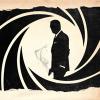WARNING, Contains a few spoilers, but no more than we've already become aware of...
REVIEW: "QUANTUM OF SOLACE": BOND AT BREAKNECK ...
Celebrating Films of the 1960s & 1970s
REVIEW: "QUANTUM OF SOLACE": BOND AT BREAKNECK SPEED

By Lee Pfeiffer
Having just returned from London where I attended the first screening in the world of the eagerly-awaited James Bond film Quantum Of Solace, I'm intrigued by the radically different reactions there have been to the film. The Times feels it is a virtual modern action classic in the same league as Casino Royale. The Daily Mail considers it a crushing bore and one of the worst Bond films ever. I must have been watching a different movie because neither description seems accurate to me. Generally speaking, one has a visceral reaction to a Bond film after viewing it for the first time. The anticipation level among fans is like a child looking forward to Christmas morning. However, after seeing Quantum Of Solace, I truly have a mixed reaction. This much is clear, however: the movie is not in the same league as its brilliant predecessor, Casino Royale (could any sequel achieve that status?) nor is it a major misfire. Believe me, I know what it's like to sit through a Bond misfire, having experienced the opening nights of The Man With the Golden Gun, Moonraker, A View to a Kill and Die Another Day - each of which convinced me the series might have finally run out of steam. I had no such reaction to QOS, feeling it probably ranks somewhere in the middle of the Bond film canon.
As I stood outside London's famed Odeon Theatre in Leicester Square, the excitement was at a fever pitch among those fortunate enough to have been invited to the screening. Security was akin to entering the Pentagon. All mobile phones were confiscated and stored until after the screening. Admission was only through possessing a brick-like, illustrated entry ticket that had obviously been designed specifically to thwart digital duplication. My major fear was being able to stay awake through the entire film, having not slept in over 24 hours and having taken a red eye flight to London, only to accompany Cinema Retro co-publisher Dave Worrall on a press junket for Fox to promote the Bond's on Blu-ray. That event was rather surrealistic in itself, as we were at the famed mansion at Bletchley Park, where British agents scored a major coup in WWII by breaking the German code. Sir Roger Moore was flown in by helicopter and we sat before a phalanx of international TV crews for almost three hours. Then Worrall and I dashed back to London for the Bond preview. I may have been dragging when I got there, but the excitement among the other journalists and celebrities attending the screening was contagious and I was rejuvenated enough to spring for one of those popcorn/soda combos that can feed a small nation. Before long, the head of Sony Pictures came on stage to welcome everyone and inform us we were among the most envied cinema-goers in the world at that moment because we would be the first to see the much-anticipated Bond film. The lights dimmed, the curtains parted and the film began to unspool before an audience so rapt with attention, you could have heard a pin drop.
Perhaps this type of anticipation set expectations so high no film could have fulfilled them. Casino Royale not only redefined the series but gained the kind of international critical praise that the Bond films had never enjoyed even in their salad days of the 1960s. What emerged on screen was a perfectly entertaining, professionally made action thriller - but one that left audience members deeply divided and some outright disappointed that it didn't measure up to its predecessor. First the bad news: the movie has a number of notable flaws. Among them: fears that the abbreviated running time (a half hour less than Casino Royale) would compromise the storyline ring true. The film opens with a high speed, gut-wrenching car chase that picks up the action from where the last film left off. However, it immediately becomes apparent that the editing will compromise the elaborately staged action sequences, rendering them a virtual blur of cuts that never last more than a half-second. This undermines the impact of the scenes and deprives them of any suspense. Yes, every other action movie is edited in the same insane way, but Casino Royale showed restraint in this area and the result was a more traditional way of presenting important scenes that ensured they had maximum emotional impact. The culprits are editors Matt Chesse and Richard Pearson, who seem intent on making the film appeal to people who don't have the attention span to sit through a movie trailer, let alone an entire feature. The other major flaw is the storyline itself which is more confusing than compelling. The action moves so quickly from exotic location to exotic location, and so many characters are introduced, that one becomes completely lost as to who is doing what to who and why they are doing so. The overall scheme by the villain is not very compelling (something about controlling water rights in Bolivia!) and there are major loopholes in the story. In one early scene, a major character appears to have been shot, only to reappear minutes later unharmed- and without any explanation given. It may not be the fault of screenwriters Robert Wade, Neal Purvis and Paul Haggis - after all, this is the same team that turned out the superb script for Casino Royale. I suspect there may have been some key expository sequences that were either left un-filmed or deleted from the final cut. Finally, my hope that the awful title song by Jack White and Alicia Keys would somehow seem better when set against the credits was left unfilled. This makes Madonna's theme from Die Another Day look like Beethoven's 5th Symphony - as the two screech like banshees through some inane lyrics.The ultimate blame for the film's flaws, however, must land squarely at the feet of director Marc Forster, whose resume boasts such acclaimed human interest stories as Monster's Ball, Finding Neverland and The Kite Runner. There were initial fears that Forster would undermine the action in terms of long, talky sequences -but ironically, Forster seems to think he's directing the next Bond video game. There are so many chase sequences shot at such a grueling pace that one wants to cling on to the all-too-brief scenes featuring extensive dialogue because it's the only time the film isn't compromised by the distracting editing.
With the bad news out of the way, there is much to enjoy in QOS, with Daniel Craig's gritty and engaging performance as the glue that holds the film together. He's even more intense in this revenge-based tale than he was the first time around and demonstrates that, in an industry largely devoid of genuine stars, he's the real deal. The film also continues the recent tradition of casting actresses who don't elicit unintentional laughter from the audience every time they open their mouths. In this case, Olga Kurylenko greatly impresses, not only with her haunting beauty, but with ability to hold her own onscreen against Craig, which is no small task. In a supporting role, Gemma Arterton is also highly impressive, though there is shockingly little romantic byplay between Bond and either lady. Judi Dench gets her most screen time ever, and she seems to get better with every performance. Equally impressive is Jeffrey Wright as Felix Leiter. It may have taken decades, but the filmmakers have finally figured out a way to make this character something other than window dressing. Wright brings a brooding intensity to the role and his appearances onscreen are most welcome. As the main villain, Dominic Greene, Mathieu Amairic (who resembles the young Roman Polanski) fits all the qualifications for a Bond baddy: he's erudite, charming and ruthless. However, the role is underwritten, perhaps due to the abbreviated running time, and this fine actor never really gets the chance to have the kind of show-stopping scene his predecessors have enjoyed. As with Casino Royale, the film's best supporting performance comes from old pro Giancarlo Giannini, reprising his role as the mysterious Mathis. His chemistry with Daniel Craig is a joy to behold and their relationship in this film parts on a sequence that is rather shocking in its intensity. I also love the fact that a major criminal organization (Quantum) has been reintroduced to the series. I've always missed the good old SPECTRE era, though I recognize that it's probably not possible to revive that specific organization. (Austin Powers and Dr. Evil have dealt that element of the Bond canon the kind of fatal blow SPECTRE villains never succeeded in doing). Hopefully, we'll be seeing more of Quantum in future films - a possibility reinforced by the reappearance of the villain Mr. White, last seen in the climax of Casino Royale. The locations are among the most varied and exotic of any Bond film and include the Chilean desert, the Baja Desert of Mexico, Panama City, Tuscany,London's Reform Club and an Austrian opera house that provides the most atmospheric sequence in the film. Kudos also go to composer David Arnold who provides his best Bond score to date.
Despite the glaring plot holes and fever-pitch pace, I enjoyed QOS and had the desire to see it again to re-evaluate its flaws and merits. I'll be doing so when I return to London next week for the world premiere and I'll post a follow-up on my reaction to the second viewing. By the way, a word to the wise: in order to understand the storyline, it's virtually essential that you see Casino Royale, or it will be even more confusing to you. Incidentally, the famed gun barrel is back - but is used in an unexpected and very effective way.
Edited by Colombo, 23 October 2008 - 01:06 PM.








